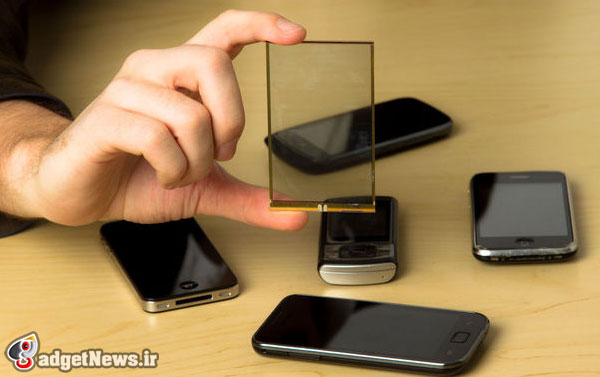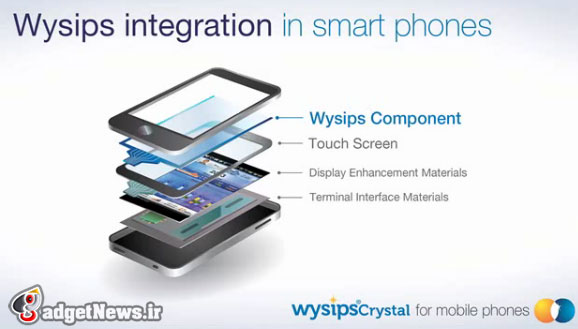
در حال حاضر فناوریهایی وجود داشته که موقعیت فرد را با تمام شدن باتری حفظ کرده و پیامک را پس از خاموش شدن گوشی ارسال میکند اما مخترعان فرانسوی فناوری جدیدی تولید کردهاند که برای همیشه نیروی باتری دستگاه را حفظ میکند.فناوری Wysips انرژی بدست آمده از نور مصنوعی و همچنین نور خورشید را به برق تبدیل کرده که برای شارژ باتری تلفن همراه مورد استفاده قرار خواهد گرفت
این فناوری از بلورهای گردآورنده نور استفاده کرده که در زیر یا روی نمایشگرهای تلفن همراه، تبلت و حتی ساعت هوشمند قرار میگیرند. پیشساختهای اولیه Wysips میتوانند با 10 دقیقه قرار گرفتن در معرض نور، چهار دقیقه عمر باتری را تامین کنند.
گروه SunPartner، سازنده این فناوری در حال کار برای گسترش سرعت تبدیل آن بوده و در حال حاضر قراردادی برای استفاده از این فناوری در گوشیهای آینده امضا کرده است.Wysips از سر واژههای «آنچه شما میبینید، سطح فتوولتائیک است» تشکیل شده است.فناوری فتوولتائیک تابشهای خورشیدی را به برق و نیمه رساناها تبدیل میکند.
سازندگان فرانسوی یک لایه نازک از ماده فتوولتائیک را در شبکهای از ریز عدسیها قرار داده تا یک صفحه نازک شفاف تولید کنند.این فناوری همچنین برای سایر نمایشگرها و پنجرهها قابل سازگاری بوده و به باور سازندگان، میتواند هر سطحی را به یک منبع انرژی تبدیل کند.
قطعات بلور Wysips طبق استانداردهای صنعتی 90 درصد شفاف بود و برای چشم غیر مسلح نامرئی است.به ادعای سازندگان، این صفحه بر کنتراست تلفن همراه، زاویه دید یا نور آن تاثیر نمیگذارد.فناوری Wysips با تبدیل انرژی نور به نیروی الکتریکی کار کرده بطور مستقیم به مدار شارژ تلفن فرستاده میشود.
قدرت نمونههای پیشساخت این دستگاه در مواجهه با نور خورشید به 2.5 مگاوات بر سانتیمتر مربع رسیده که برای هر 10 دقیقهای که تلفن همراه در معرض منبع نور قرار داشته، دو ساعت و چهار دقیقه شارژ برای مکالمه ارائه میکند.

به گفته سازندگان، محصولات دارای یک ورقه با شفافیت 60 تا 70 درصد میتوانند تا 10 مگاوات بر سانتیمتر مربع نیرو تولید کنند که حدود 16 دقیقه عمر باتری بیشتر برای هر 10 دقیقه مواجهه با نور است.
ماه گذشته شرکت SunPartner و شرکت ارتباطات TCL از ساخت پیشساختهای تلفن هوشمندی خبر دادند که با نور کار میکنند و ممکن است در گوشیهایAlcatel One Touch مورد استفاده قرار بگیرند. اولین نمونههای پیشساخت قرار است تا سال 2014 آماده شوند.قطعات در طول فرآیند ساخت نصب شده و به یک تراشه الکترونیکی متصل میشوند که برق تولید شده را تبدیل و تنظیم میکند.فناوری Wysips همچنین میتواند برای گسترش دادن زاویه دید دستگاههای با نمایشگر کوچک مورد استفاده قرار بگیرد.
منبع : whathifi
Wysips technology turns smartphone displays into battery chargers
A mobile phone in which the display acts as a battery charger? That's the thinking behind Wysips, a technology from French solar energy specialists SunPartner, which demonstrated it at Mobile World Congress in Barcelona.
Wysips – it stands for What You See Is Photovoltaic Surface – is a transparent material able to be installed beneath the glass screen of mobile devices, or built into add-on charging devices. It's 90% transparent, and 0.5mm or less thick, and uses a combination of micro-lenses and photovoltaic materials to charge the battery of the device in or with which it's used.
The semi-cylindrical lenses are designed to maximise the light capture while keeping the layer invisible to the naked eye, and the system will work on either natural or artificial light. The lens system also has the advantage of increasing the viewing angle of a screen.
Wysips can already deliver 5.8mW per square centimetre, and the company hopes to double that output by next year.
SunPartner has already invested in a plant to produce its Wysips Crystal panels in Rousset, near Aix-en-Provence, with a capacity of 8m components a year:the factory is scheduled to start up in the next few months, with a view to equipping the first smartphones with the technology before the end of this year.
And it's already looking at other applications, including watches, tablets and laptops, as well as self-powered advertising displays – its Wysips Cameleon system can be used over areas as large as two square metres.
Wysips Glass technology is usable for windows in buildings, cars, planes and the like, delivering a 30W peak output per square metre, while its also involved in a consortium developing Wysips Textile, a power-generating fabric usable for blinds, awnings and even the roofing for sports venues.
As SunPartner's Vice President Technology and Transport, Jean-Luc Ledys (left), puts it: 'Yield and transparency : the market pushes for those performances and new functionalities.
'Tomorrow’s world begins today; given its stockpile of on-board items, it will need clothing, luggage etc. capable of generating the energy used to power all of those nomad electronics!'
 گجت نیوز آخرین اخبار تکنولوژی، علم و خودرو
گجت نیوز آخرین اخبار تکنولوژی، علم و خودرو 




